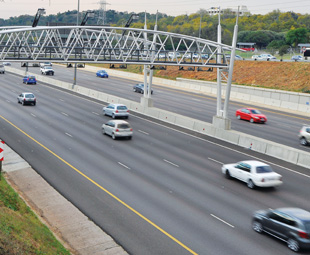What’s in a number?

Bringing you 699 reasons to keep on paying into the Opposition to Urban Tolling Alliance’s (OUTA’s) war chest
I feel sorry for the 30 000 or so people who have been hit hard by the collapse of the “R699” car scheme. But have we learned anything? While it wouldn’t have surprised anyone familiar with motor car economics, on the other hand it probably hasn’t taught us much either.
Most South Africans don’t bother to keep track of how much their personal transport arrangements cost them. This makes them easy prey for the motor/oil/road construction fraternity which, quite understandably, is out to sell more cars and fuel and build more road space.
Oh, I forgot the banks, some of which are only too happy to finance all of this. Hopefully the R699 investigation will also throw some light on their role.
So, while we may smugly dismiss these suckers as victims of yet another Ponzi scheme, some soul searching is in order. South Africa (SA) is on slippery ground with its failure to focus properly on motoring costs. Our entire road network is a long-term Ponzi scheme, with many motorists (including the writer) driving cars which are too big for them.
Unlike the R699-type of scheme, which usually collapses spectacularly, but hurts a relatively small number of people, our national Ponzi scheme just slowly bleeds the whole economy, diverting resources that could be used for other purposes; such as building houses, for example. We need a reminder that our transport costs are unsustainable and that the economy is hurting as a result. Let’s unpack a few numbers.
1. If every car on SA’s roads was valued at R150 000 (a figure which is probably on the low side), that gives us a total investment of R1,2 trillion. That is a lot of money – if we could shave it by 10 percent, we could release R120 billion back into the economy to spend on other things. What is more, unlike a house, which should last forever (in theory) a car has to be replaced about every ten to 15 years, meaning our already-battered economy has to find the money to replace cars, over and over again.
2. Then there is the question of our balance of payments. Although the amount varies from month to month and is impossible to pin down exactly, we have a permanent trade deficit, a big slice of which is due to the importation of cars and the fuel needed to keep them moving. To compensate for this we have to stay on the treadmill of exporting raw materials.
3. Then there is the cost of the journey to work. The cost of moving goods around the country is always under the spotlight (see the Council for Scientific and Industrial Research (CSIR) State of Logistics Report), but no similar calculations are done for annual motor car costs – which are in the order of R400 billion a year. If 50 percent of this is “work-related” (a South African National Roads Agency (Sanral) figure) we should add R200 billion to the cost of doing business in SA.
Sadly, numbers like this are not taught at South Africa’s business schools, neither are they on the radar of our accounting profession, our economists or sociologists. They are also not likely to resonate with our well-paid and middle class who see a car as an essential item.
We have come to believe that what is good for the motor industry is good for the economy. Economists – especially those aligned with the banks – would have us believe that car sales are a “barometer of confidence” in the economy.
Indeed one economist has gone so far as to argue that the Government’s Automotive Development Programme (why not just call it a subsidy?) that “develops” the industry to the tune of around R10 billion a year, has resulted in a bigger variety of cars in South Africa which is good for “staff morale”. (Business Day, April 11, 2013).
“Cash-strapped” motorists often complain of high fuel costs and e-tolls, but looking at some of the vehicles on our roads, and the way they are driven, there are very few motorists who can honestly say that economical motoring is high on their list of priorities.
This plays right into the hands of the oil/motoring/construction/banking fraternity. If motorists are going to be irrational, why should the government be any different when it comes to constructing more roads and financing them in questionable ways, such as e-tolls?
So what does the number 699 mean? It represents not only a monthly repayment, but is also the number of billions of rand that could be saved in ten years if we fixed our public transport.
In the meanwhile, keep on contributing to Outa’s war chest. We are going to need it to pay for legal fees.
Vaughan Mostert is a senior lecturer in the Department of Transport and Supply Chain Management at the University of Johannesburg. He developed a love for public transport early in life, which led to a lifelong academic interest in the subject. Through Hopping Off, Mostert leaves readers with some parting food for thought as he continues his push for change in the local public transport industry.
Published by
Focus on Transport
focusmagsa




